 Shoulder injuries can be painful and sometimes even debilitating. They are also incredibly common. In fact, 18 – 26% of adults experience shoulder pain at any time, making it one of the most common regional pain syndromes according to population surveys. Two common shoulder injuries often mistaken for one another are separated shoulders and dislocated shoulders. So, how do you know which orthopaedic injury you’re dealing with?
Shoulder injuries can be painful and sometimes even debilitating. They are also incredibly common. In fact, 18 – 26% of adults experience shoulder pain at any time, making it one of the most common regional pain syndromes according to population surveys. Two common shoulder injuries often mistaken for one another are separated shoulders and dislocated shoulders. So, how do you know which orthopaedic injury you’re dealing with?
Both are typically associated with a traumatic event like a sports-related injury or fall. However, the difference primarily lies in the location and degree of the injury. Knowing the differences between these two shoulder injuries can help you better understand the injury you may have and the best course of action for treating it.
In this post, we’ll first explain what dislocated shoulders and separated shoulders are. Then, we’ll go over the differences between the two, including how they are treated.
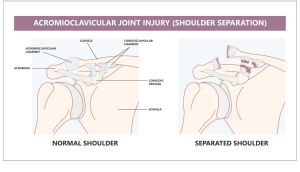 What is a separated shoulder?
What is a separated shoulder?
Contrary to its name, a separated shoulder, also known as an acromioclavicular (AC) joint separation or sprain, doesn’t directly impact the shoulder joint. Instead, it refers to an injury that occurs when one of the ligaments connecting the collarbone (clavicle) to the shoulder blade (acromion) is stretched or torn. The most common cause of a separated shoulder is a fall onto the shoulder or an outstretched arm, but it can also be caused by contact sports or a direct blow to the shoulder.
What are some common symptoms of a separated shoulder?
- Pain, especially at the time of the injury.
- Sizeable bump over the injury site, typically at the top of the shoulder
- Limited range of motion
- Tenderness of the shoulder and collarbone
- Muscle spasms
- Tingling sensation in the shoulder
- Bruising
- Numbness
- Weakness in the shoulder or arm
- Difficulty lifting the arm
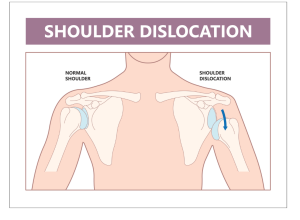 What is a dislocated shoulder?
What is a dislocated shoulder?
Usually, a dislocated shoulder is considered a slightly more serious injury than a separated shoulder. It occurs when the head of the humerus (upper arm bone) is forced out of its socket in the shoulder blade. Dislocation usually occurs as the result of a severe impact or fall, but it can also happen from repetitive stress on the shoulder joint.
What are some common symptoms of a dislocated shoulder?
- Severe pain in the shoulder joint and upper arm
- A visible deformity or lump in the front or back of the shoulder
- Difficulty moving the arm
- Swelling and bruising around the shoulder
- Numbness or tingling in the arm or hand
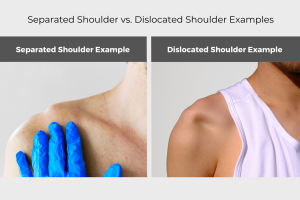 How can you tell the difference between the two?
How can you tell the difference between the two?
You know now that a dislocated shoulder is a more serious injury than a separated shoulder. Also, you learned that shoulder separation is an injury to the ligament between the shoulder blade and collarbone. While a shoulder dislocation happens when the top of the arm bone loses touch with the socket of the shoulder blade. However, if you’re still asking, “Is my shoulder dislocated or separated,” try answering the following questions:
- Where does your shoulder or arm look deformed? You may not experience any visible deformity with either injury. However, if you do, pay attention to its location. Do you have a bump on the top of your shoulder? If so, your injury could likely be a separated shoulder. Do you have a bump on the front or back of your shoulder? Is your arm positioned slightly away from your body with your forearm turned away from your body? Or are you experiencing a loss of the rounded contour of the deltoid (the muscle that caps the shoulder)? If so, you could possibly have a dislocated shoulder.
- Where and how intense is your pain? Though both injuries can be very painful. Dislocated shoulders are typically considered to cause more intense pain than separated shoulders. Additionally, if the pain is in your upper arm and shoulder versus at the very top of your shoulder, you could likely have a dislocated shoulder instead of a separated shoulder.
- Have you had a dislocated shoulder before? Unfortunately, once you dislocate your shoulder, it is vulnerable to repeat injury. So, if you’ve had one before, you could very likely have a dislocated shoulder again.
Importantly, it is still often difficult to tell the difference between the two injuries without proper imaging and a professional examination. Both injuries can worsen and lead to serious complications if left untreated. If you feel you have either of these injuries, you should seek medical attention immediately.
 How do you treat a separated shoulder?
How do you treat a separated shoulder?
Treatment for a separated shoulder typically involves rest, ice, compression, and elevation (commonly known as RICE therapy) to reduce swelling and inflammation. Pain medications such as non-steroidal anti-inflammatory drugs (NSAIDs) may also be prescribed. A sling may also be used to keep the shoulder immobilized and support the injured area. Your doctor may also recommend physical therapy to restore strength, mobility, and function of the affected area. In severe cases, surgery may be required.
 How do you treat a dislocated shoulder?
How do you treat a dislocated shoulder?
For a dislocated shoulder, one must relocate (often referred to as ‘pop’) it back into its normal position as soon as possible. However, DO NOT try to pop your arm back into place yourself. A medical professional should do this to avoid damaging the tissues, nerves, and blood vessels around the shoulder joint. After the shoulder is relocated, your doctor may recommend a sling to keep it immobilized and support the injured area. Further treatment may involve physical therapy to help restore the range of motion and strength in the shoulder. Surgery may also be necessary in more severe cases.
When should I consult a physician?
In closing, if you feel you may have either of these injuries, please see medical attention immediately. Additionally, if you are experiencing any type of mild to severe pain, deformity, and/or limited range of motion in the shoulder area, you should seek medical attention as soon as possible.
 Dr. Christopher Cook is a Board-Certified Orthopaedic Surgeon and Sports Medicine & Joint Replacement Specialist at Advanced Ortho and Spine. He provides a full spectrum of Joint Replacement, Sports Medicine, and Shoulder & Upper Extremity services. Contact us today for more information or to request an appointment.
Dr. Christopher Cook is a Board-Certified Orthopaedic Surgeon and Sports Medicine & Joint Replacement Specialist at Advanced Ortho and Spine. He provides a full spectrum of Joint Replacement, Sports Medicine, and Shoulder & Upper Extremity services. Contact us today for more information or to request an appointment.
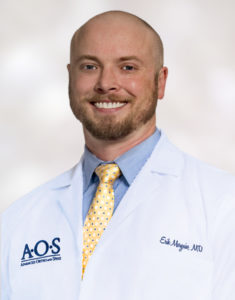 Dr. Erik Maryniw is a Board-Certified Hand and Upper Extremity Orthopaedic Surgeon at Advanced Ortho and Spine. He provides a full spectrum of Orthopaedic care and Microvascular Surgery from the hand to the shoulder. Contact us today for more information or to request an appointment.
Dr. Erik Maryniw is a Board-Certified Hand and Upper Extremity Orthopaedic Surgeon at Advanced Ortho and Spine. He provides a full spectrum of Orthopaedic care and Microvascular Surgery from the hand to the shoulder. Contact us today for more information or to request an appointment.
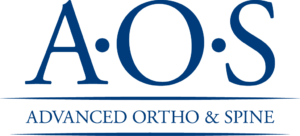
With two locations near Nashville in Mt. Juliet and Hermitage, Advanced Ortho and Spine provides patients with high-quality, personalized care. We also strive to advance orthopaedic excellence. Contact us today to learn more or to schedule your appointment.
Disclaimer: This blog provides general information and discussions about health and related subjects. The information and other content provided in this blog, or in any linked materials, are not intended and should not be construed as medical advice, nor is the information a substitute for professional medical expertise or treatment.If you or any other person has a medical concern, you should consult with your healthcare provider or seek other professional medical treatment. Never disregard professional medical advice or delay in seeking it because of something read on this blog or in any linked materials. If you think you may have a medical emergency, call your doctor or emergency services immediately.
The opinions and views expressed on this blog and website have no relation to those of any academic, hospital, health practice, or other institution.

